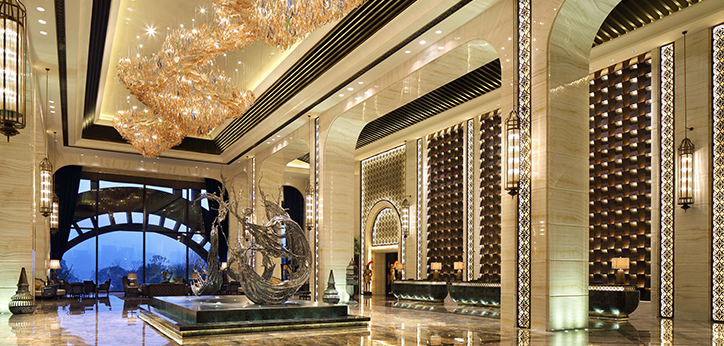Disney is set to open its first park on the Chinese mainland next month as part of a joint venture between The Walt Disney Company and Chinese state-owned consortium Shanghai Shendi Group. It will be one of the largest foreign investments in China—but the planned Shanghai Disneyland is facing a notable challenger for local families seeking a theme park.
Wanda Group, founded by billionaire founder Wang Jianlin, is slated to open its own entertainment complex this month: Wanda Vista Nanchang, in the capital of Jiangxi Province, in southeastern China. Beyond the outdoor theme park, Wanda's $3.2-billion site will also have 10 hotels within the complex. Disney's park will only have two hotels with a total of 1,220 rooms between them.
In a recent interview, Wang said that this new park—along with the three already open and more in the planning stages—will keep the Shanghai Disney Resort from seeing a profit for as long as 20 years.
Wanda's Plan
"...the frenzy of Mickey Mouse and Donald Duck and the era of blindly following them have passed." -Wang Jianlin pic.twitter.com/gRjDR1ppV0
— Wanda Group (@DalianWanda) May 23, 2016
Wanda is looking to open 15 to 20 amusement parks in mainland China to attract 200 million visitors. The company is targeting the burgeoning Chinese middle class, which is poised to be the driving force behind the country's $610 billion tourism industry. The government predicts tourism numbers will double over the next four years.
Citing an old Chinese proverb that "one tiger is no match for a pack of wolves," Wang suggested that Disney should not have entered mainland China, and that he plans to "overtake Disney" as the biggest global tourism company by 2020.

And he may be onto something. Disney parks are, to put it kindly, not cheap (locals are already complaining about the prices), and Wang's developments may offer a more price-friendly alternative. Tickets for Wanda’s Nanchang complex are priced at 198 yuan (just over $30) on most days and 248 yuan on holidays and weekends—about half the planned price of Shanghai Disneyland, which charges adults 370 yuan each ($56) for regular tickets and 499 yuan during peak days.
According to sources, Disney has spent $5.5 billion on its 963-acre Shanghai resort so far, while Wanda spent $3.2 billion on its similarly sized park. Wang criticized the decision to build a complex in a location with intemperate weather (rainy summers, cold winters), and suggested that the California-based conglomerate did not plan the project very well.
Disney made its debut in the region more than 10 years ago with a Hong Kong resort, and broke ground on its third hotel within the complex more than a year ago after the two existing properties reported consistent occupancy levels surpassing 90 percent. (The 750-room Disney Explorers Lodge at the Hong Kong resort is slated to open in early 2017.) Earlier this year, the Hong Kong complex reported a loss of $19 million in the year ending early-October 2015, its first loss in four years amid declining domestic attendance. Sources at the time blamed China's sluggish economic growth. As such, a less-expensive alternative may go over well with locals, who also may be eager to support a homegrown business. Also, as opposed to Disney, Wanda's park will promote national pride with a strong Chinese theme and focus.
Of course, Disney is a much-beloved global brand, and no other park can offer meet-and-greets with Cinderella, Snow White and Elsa. It remains to be seen who the victor will be, but the mere presence of a challenger is worthy of note. (Disney, for its part, claimed that Wang's statements were "not worthy of a response.")
